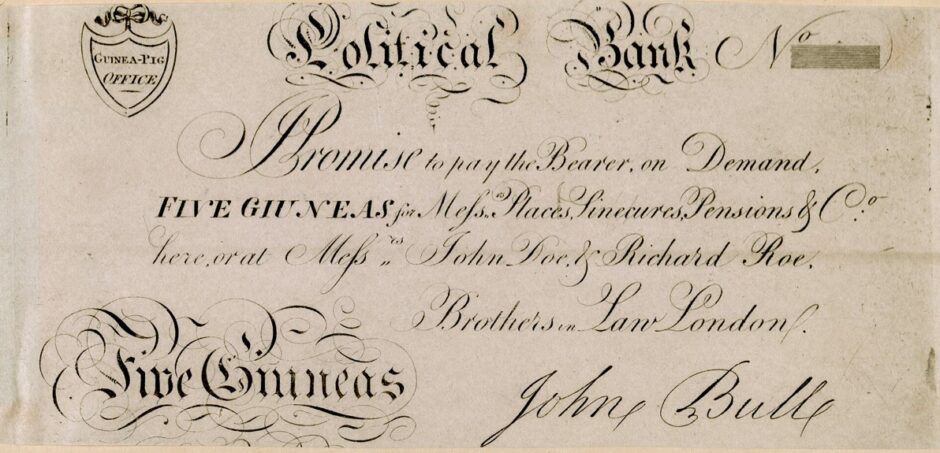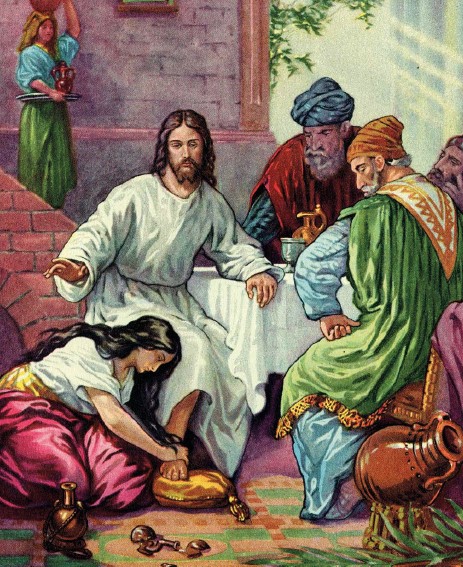A SCHOOLBOY ONCE defined faith as “When you believe things that you know aren’t true”. That’s actually how many people regard faith—an attitude of mind that’s the preserve of naïve and wishful people.
In fact, faith is a matter of daily life. Without faith society would collapse. For example, we all understand the value of bank notes—but bank notes are merely pieces of paper. They have value because our country’s Central Bank promises that the note could theoretically be exchanged for real money. We believe that promise. We have faith in the bank.
Why do we trust that the bank will honour its promise? We have two reasons:
- A promise is a serious matter. If someone breaks a promise, they lose people’s trust. If a country’s Central Bank was to fail to honour its bank notes, the country’s financial system could collapse.
- We have the benefit of experience. If you have used bank notes to buy things in the past, you have every reason to believe that the next time you hand one over you will get its value in goods.
The Bible records many promises that are made by God Himself, the Creator of the universe. Can we trust those promises? We certainly can! For the same two reasons:
- A promise is a serious matter. A promise made by God is of the utmost importance, because the character of God stands on the reliability of His word.
- We have the benefit of experience. In the past God’s promises have been fulfilled, therefore we can have confidence in His promises for the future.
Examples of Faith
Frequently Jesus underlined the importance of faith. Luke 7:1–10 contains the account of the Roman Centurion who wanted Jesus to heal his servant. He did not feel worthy for Jesus to come to his house, instead he believed that Jesus could simply say the word and his servant would be healed. What an amazing thing, that a Roman Centurion would say that to a Jewish carpenter! But the Centurion recognised that Jesus had authority over the forces of nature. Jesus was impressed, and said ‘I tell you, not even in Israel have I found such faith’ (v. 9). He did as the centurion asked.
In the same chapter we see the account of the woman who approached Jesus and washed his feet in the home of Simon the Pharisee (vs. 36–49). She had a shameful past, but maybe she had heard Jesus’ promise, ‘Come to me, all who labour and are heavy laden, and I will give you rest’ (Matthew 11:28). She understood that Jesus had come to help people like her. So, putting all embarrassment to one side and ignoring the disapproval of Simon and others, she performed for Jesus the most menial task of service. Jesus assured her: ‘Your faith has saved you; go in peace’ (Luke 7:50). She believed that he could take away her burden of guilt, and her faith was rewarded. As for Simon the Pharisee, he was unaware of any burden and therefore did not receive the blessing of forgiveness.
Among the most striking examples of faith is the criminal who was crucified along with the Lord Jesus (Luke 23:39–43). From what he said to Jesus as they hung together, it is evident that he knew a lot about Jesus and his teaching about the Kingdom of God, but his heart had not been touched. But now, seeing Jesus in terrible agony and even praying for the Roman soldiers who were crucifying him, the attitude of the criminal changed. He remembered the words of Jesus and faith was born in his heart: ‘Jesus, remember me when you come into your kingdom’ (v. 42). What marvellous faith! It would be easy to believe when seeing the miracles and the vast crowds following Jesus. But this man saw Jesus, drenched in his own blood, helpless and dying; he heard the sneers of the Pharisees; yet he believed. Without doubt his words were a tremendous encouragement to Jesus as he endured the agony of those final hours on the cross.
Faith in the Promises
There is one chapter of the Bible which is all about faith: Hebrews chapter 11. It’s sometimes known as ‘the faith chapter’. Firstly the writer defines faith: ‘Now faith is the assurance of things hoped for, the conviction of things not seen’ (v. 1).
‘The assurance of things hoped for’—belief in God’s promises. Promises concern future events, and by believing those promises one shows faith. By faith things promised become realities in the mind of the believer.
The chapter follows with example after example of faithful men and women whose faith was so strong that they were prepared to make great sacrifices in order to gain those promises. He mentions Noah who built the ark because he believed that God’s word would be fulfilled (v. 7). He mentions Abraham who was prepared to sacrifice his son believing that if he did God would raise him from the dead (vs. 17–19). He mentions Joseph who, when he was dying, commanded that his bones be taken back for burial in Israel, so strong was his faith that his people would one day return to their land (v. 22). He mentions Moses who grew up as an Egyptian prince but who left the life of luxury because he valued the promises of God higher than the treasures of Egypt (v. 26).
He mentions Rahab who believed that the God of Israel was the true God and so she hid the Israelite spies (v. 31). Always, faith was revealed in action, not in mere words.
Thus the chapter continues, but the important point for us to note is that those faithful men and women were individuals out of the crowds. The crowds ignore God and His promises—this is how it is and how it’s always been. But some individuals, one here and one there, believe. In the eyes of those individuals, the promises of God and the hope of His Kingdom shine brighter than the attractions of the present world.
The chapter ends thus: ‘And all these, though commended through their faith, did not receive what was promised, since God had provided something better for us, that apart from us they should not be made perfect’ (vs. 39–40).
The Attitude of Faith
Jesus told a parable about workers who were hired to work in a vineyard (Matthew 20:1–14). It is a simple story about a landowner who hired labourers.
At the beginning of the day he hired the first gang, and made an agreement with them to pay one penny for a day’s work. At the third hour and again at the sixth and ninth hours, and finally at the eleventh hour with only one hour of the day left to work, he hired more men. The salary was not discussed—he simply promised to pay ‘whatever is right’ (v. 4). But who would decide what is right? The labourers were prepared to leave that for him to decide— they trusted him to deal with them fairly.
At the end of the day the householder paid their wages. Starting with those who had only worked for one hour, he paid them each a penny (with which they were no doubt very pleased). But when it came to those who had worked all day, they received only a penny as well. They complained, but he reminded them that he was paying them according to the terms of the contract they’d made.
What lesson arises from this parable? This is the lesson: if we are minded to go to God insisting on our ‘rights’, we ought to remember what our rights are according to the Bible: ‘The wages of sin is death’ (Romans 6:23). We are all sinners (Romans 3:23), so death is what we deserve. Thankfully, Romans 6:23 does not stop there:
The wages of sin is death, but the free gift of God is eternal life in Christ Jesus our Lord.
Faith is the attitude that believes God’s promises, and trusts that they are right and good though undeserved.
The Life of Faith
If Hebrews 11 is ‘the faith chapter’, Romans 6 is ‘the baptism chapter’, because it explains all about baptism.
Baptism is the start of the Christian life, when the believer is dipped under water as a symbolic death and resurrection. By this they show that they accept the salvation that Christ attained by his death, and they want to live a new life dedicated to him: ‘We were buried therefore with him by baptism into death, in order that, just as Christ was raised from the dead by the glory of the Father, we too might walk in newness of life’ (v. 4). Baptism is the way we show that we believe God, and we‘re going to put that belief into action in our lives.
Why is there so much emphasis in the Bible on faith? Well, suppose you made an important promise to a friend but the friend shook his head and said, ‘I don’t trust your promise’. Can you imagine a more hurtful insult? How much more then, if we should say to God, ‘I don’t trust Your promises’.
By our faith we can honour God. By lack of faith we insult Him.
Without faith it is impossible to please him, for whoever would draw near to God must believe that he exists and that he rewards those who seek him (Hebrews 11:6).
David Budden





